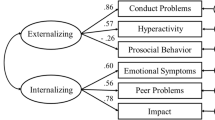Abstract
The central question at issue was the role of both infant and parent temperament in determining child adjustment at age 4. Within the conceptual framework of the New York Longitudinal Study (NYLS), both infant and parent temperament were assessed. Factor analyses yielded three comparable infant and parent temperament factors: Mood, Energy, and Consistency. Correlations with teacher ratings of child adjustment indicated the most significant relationship to be with the infant girls' Mood factor (comparable to the NYLS high-risk “difficult” infant factor). No infant factors were found to relate to boys' adjustment, while maternal Mood was significant across sexes. Indices of the temperamental similarity within families also revealed sex differences relative to adjustment, with similarity across all family members significantly related to adjustment for girls and boy-father dissimilarity significant for boys. Discussion centered around continuity-discontinuity issues relevant to sex differences.
Similar content being viewed by others
References
Baumrind, D. Child care practices anteceding three patterns of preschool behavior.Genetic Psychology Monographs, 1967,75, 43–88.
Baumrind, D., & Black, A. E. Socialization practices associated with dimensions of competence in preschool boys and girls.Child Development, 1967,38, 291–327.
Bell, R. Q. A reinterpretation of the direction of effects in studies of socialization.Psychological Review, 1968,75, 81–95.
Bell, R. Q. Stimulus control of parent in caretaker behavior by offspring.Developmental Psychology, 1971,4, 63–72.
Birns, B., Barten, S., & Bridger, W. H. Individual differences in temperamental characteristics of infants.Transactions of the New York Academy of Sciences, 1969,31(8), 1071–1082.
Bronson, W. C. Adult derivations of emotional expresiveness and reactivity-control. In N. Bayleys, J. W. MacFarlane, & M. D. Hbnzik (Eds.),The course of human development, Waltham, Massachusetts: Xerox College Publications, 1971.
Buss, A., & Plomin, R.A temperament theory of personality. New York: Wiley, 1975.
Carey, W. B. A simplified method for measuring infant temperament.Journal of Pediatrics, 1970,77, 188–494. (a)
Carey, W. B.Survey of temperamental characteristics. No. Maps 01044. New York: ASIS National Auxiliary Publications Services, 1970. (b)
Carey, W. B. Measuring infant temperament.Journal of Pediatrics, 1972,81, 414.
Clarke-Stewart, A. K. Interactions between mothers and their young children: Characteristics and consequences.Monographs of the Society for Research in Child Development, 1973,38(6–7, Whole No. 153).
Eichler, L. S., Winickoff, S. A., Grossman, F. K., Anzalone, M. K., & Gofseyeff, M. H.Adaptation to pregnancy, birth and early parenting: A preliminary view. Paper presented at the American Psychological Association Convention, San Francisco, 1977.
Graham, P., Rutter, M., & George, S. Temperamental characteristics as predictors of behavior disorders in children.American Journal of Orthospychiatry, 1973,43(3), 328–335.
Kagan, J., & Moss, H. A.Birth to maturity: A study in psychological development. New York: Wiley, 1962.
Sameroff, A. J., & Kelly, R.Socioeconomic status, racial and mental health factors in infant temperament. Unpublished manuscript, University of Rochester, 1975.
Stayton, D. J., Hogan, R., & Ainsworth, M. D. S. Infant obedience and maternal behavior: The origins of socialization reconsidered.Child Development, 1971,42, 1057–1065.
Stollak, G. E.Survey of adult temperament characteristics. Michigan State University, 1974.
Thomas, A., & Chess, S.Temperament and development. New York: Brunner/Mazel, 1977.
Thomas, A., Chess, S., & Birch, H. G.Temperament and behavior disorders in children. New York: Psychological Corporation, 1968.
Thomas, A., Chess, S., Birch, D. B., Hertzig, M. E., & Korn, S.Behavioral individuality in early childhood. New York: New York University Press, 1963.
Thorndike, R. L.Thorndike dimensions of temperament. New York: Psychological Corporation, 1963.
Thorndike, R. L.Thorndike dimensions of temperament manual. New York: Psychological Corporation, 1966.
Wilson, C. D., & Lewis, M.Temperament: A developmental study in stability and change during the first four years of life. Princeton: Educational Testing Service, 1974.
Author information
Authors and Affiliations
Additional information
The authors would like to express appreciation to Alexander Thomas for his help in planning this research and reviewing the manuscript.
Rights and permissions
About this article
Cite this article
Scholom, A., Zucker, R.A. & Stollak, G.E. Relating early child adjustment to infant and parent temperament. J Abnorm Child Psychol 7, 297–308 (1979). https://doi.org/10.1007/BF00916539
Revised:
Issue Date:
DOI: https://doi.org/10.1007/BF00916539




